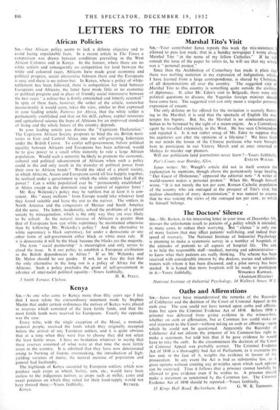Marshal Tito's Visit
SIR,—Your contributor Janus repeats this week the misstatement I allowed to pass last week: that in a Sunday newspiper I wrote about Marshal Tito " in the name of my fellow Catholics." If he will consult the issue of the paper he refers to, he will see that my article was a " personal protest."
Since then the Archbishop of Canterbury has made it plain that there was nothing sectarian in my expression of indignation, which, I have learned -from a large correspondence, is shared by Christians of all denominations all over the country. The suggested visit of Marshal Tito to this country is something quite outside the civilities of diplomacy. lf, after Mr. Eden's visit to Belgrade, there were still political questions to discuss, the Yugoslav foreign minister should have-come here. The suggested visit can only mean a singular personal expression of esteem.
The only defence sib far offered for the invitation is scarcely flatter- ing to the Marshal; it is said that the spectacle of English life may temper his bigotry. But, Sir, the Marshal is no nineteenth-century Sultan to be bemused by the sight of a steam-engine. As a Cominform agent he travelled extensively in the West. He has seen Christendom and rejected it. Is it not rather smug of Mr. Eden to suppose that his cajoleries can alter the opinions of a life-time ? We have fresh in our minds the lesson of the Chinese partisans who were brought here to participate in our Victory March and at once returned to Malaya to murder otr planters. Will our politicians (and journalists) never learn ?—Yours faithfully, EVELYN WAUGH. Pier's Court, near Dursley, Glos.
Janus writes: Mr. Waugh's article did not in itself contain the explanation he mentions, though above the portentously large heading " Our Guest of Dishonour," appeared the editorial note " A writer of world-renown makes a personal protest." When Mr. Waugh himself wrote, " It is not merely the ten per cent. Roman Catholic population of the country who are outraged at the prospect of Tito's visit, but zealous churchmen of every denomination," it was natural to assume that he was voicing the views of the outraged ten per cent., to which he himself belongs.


































 Previous page
Previous page